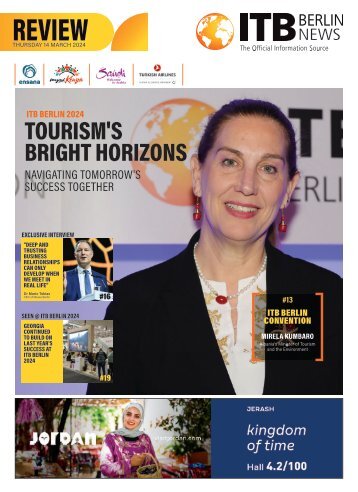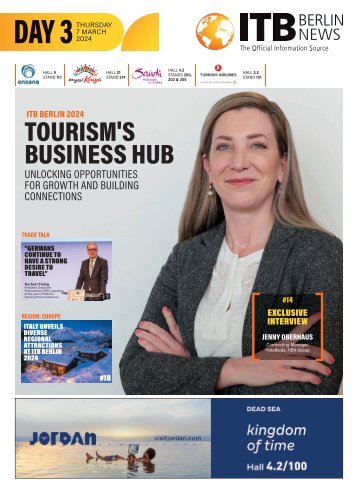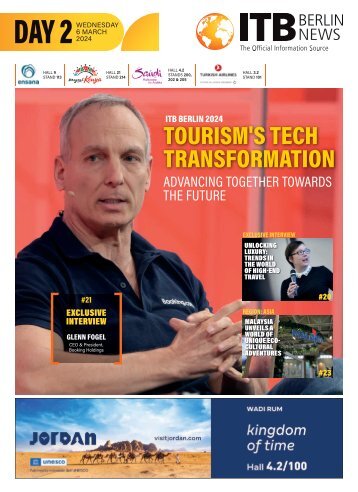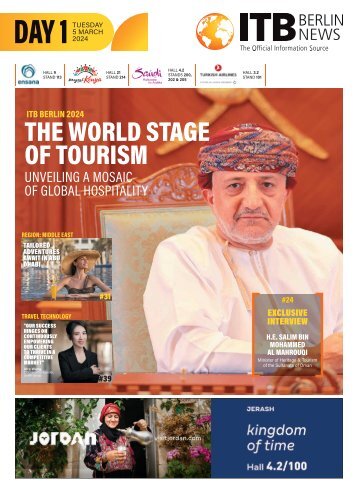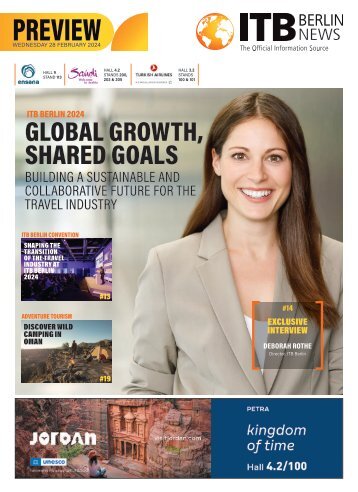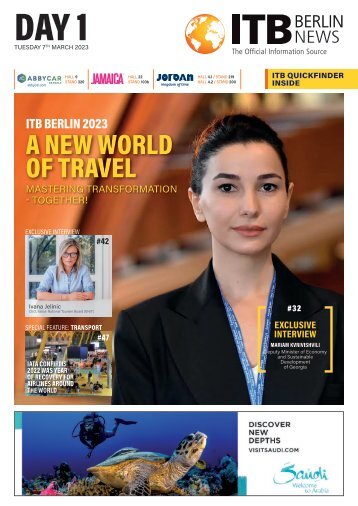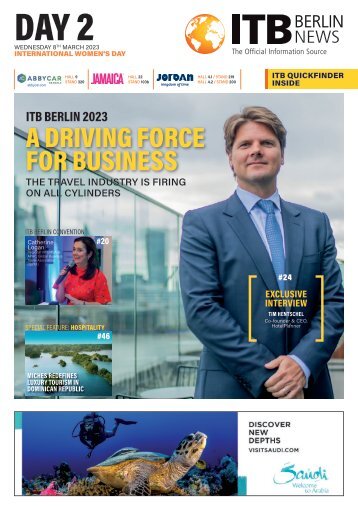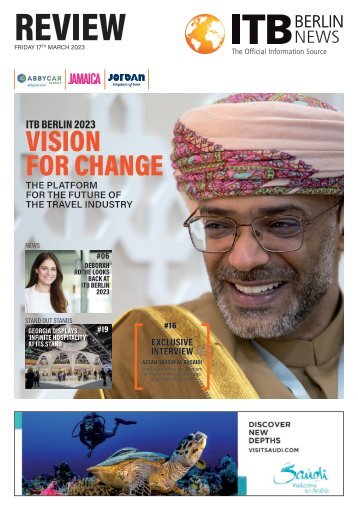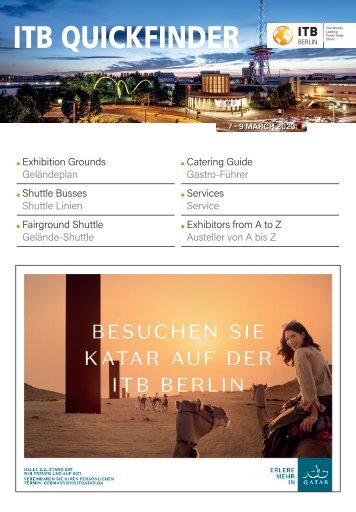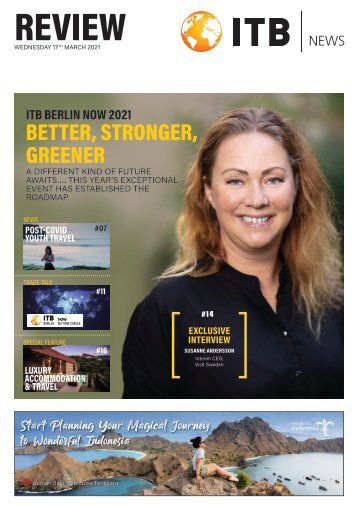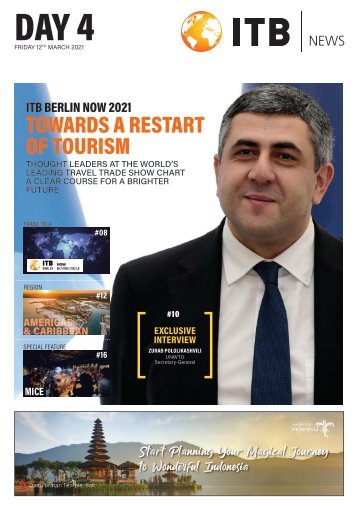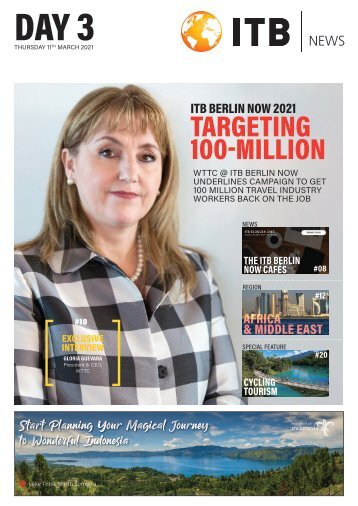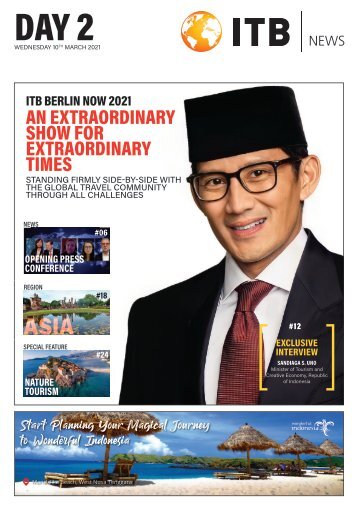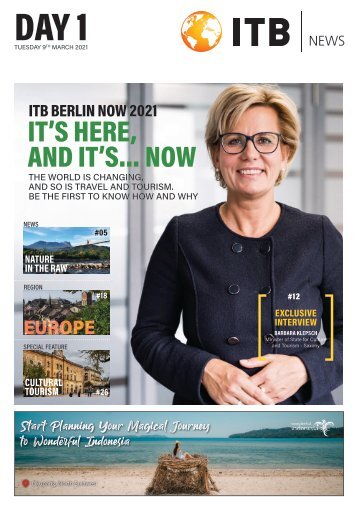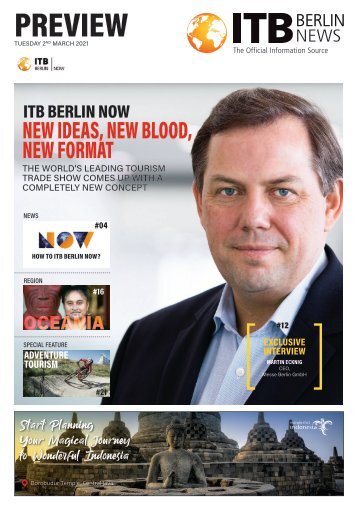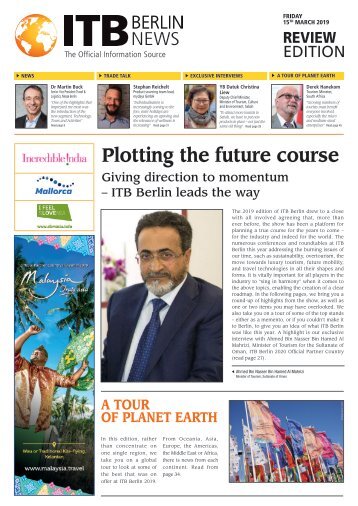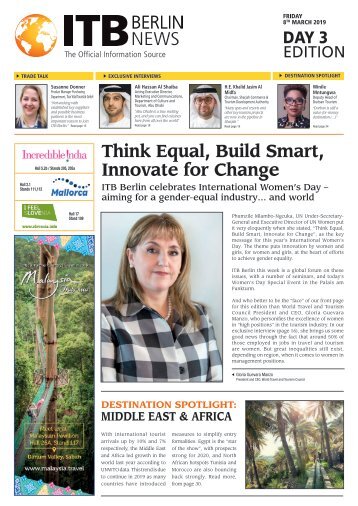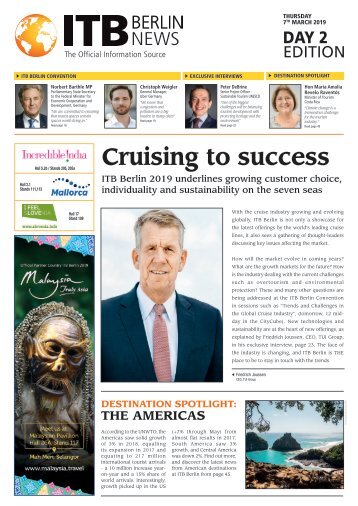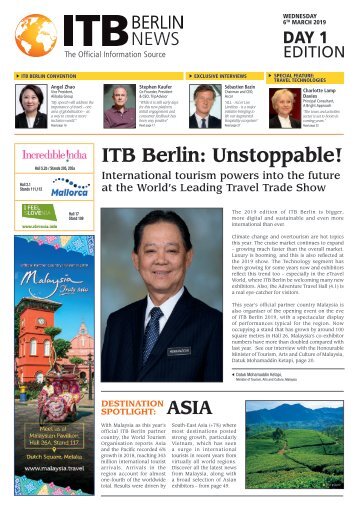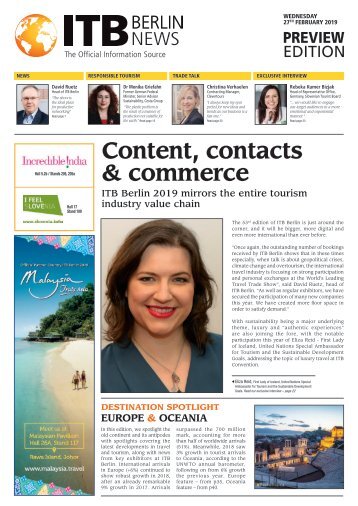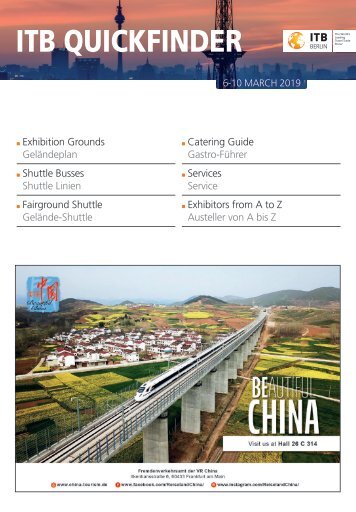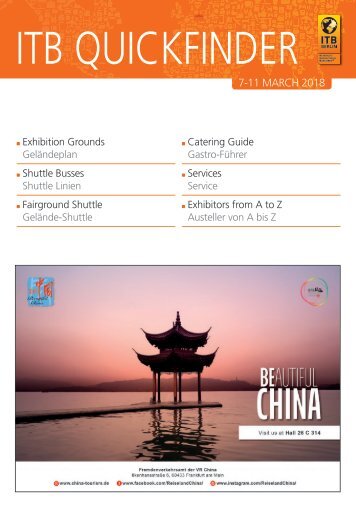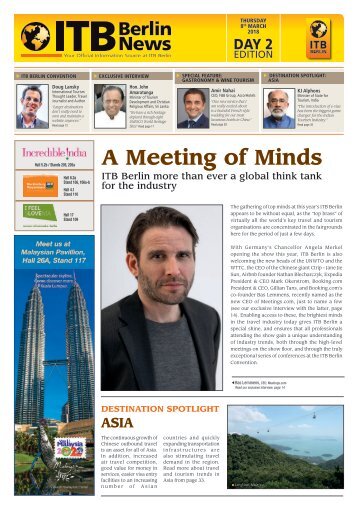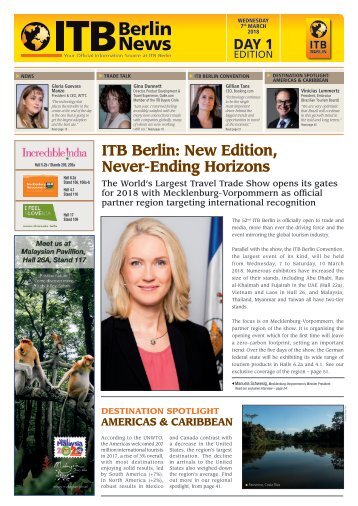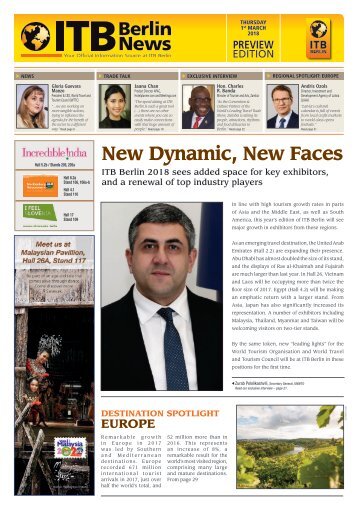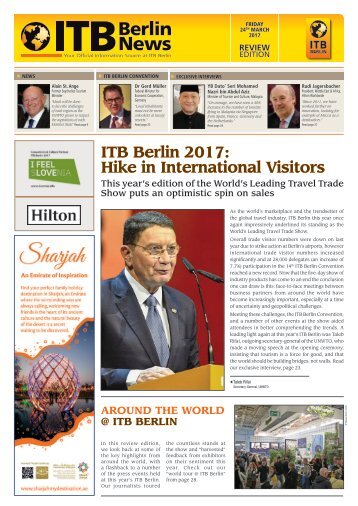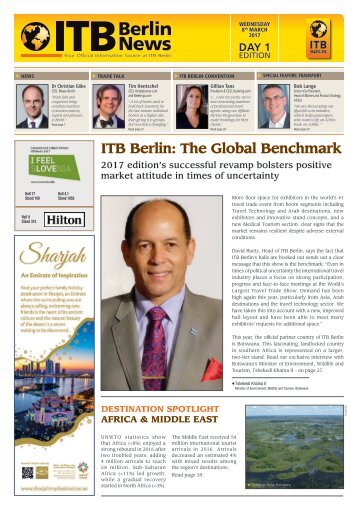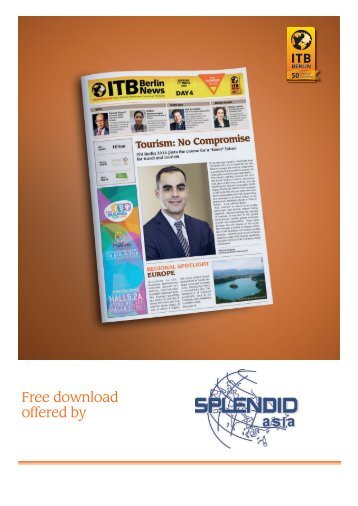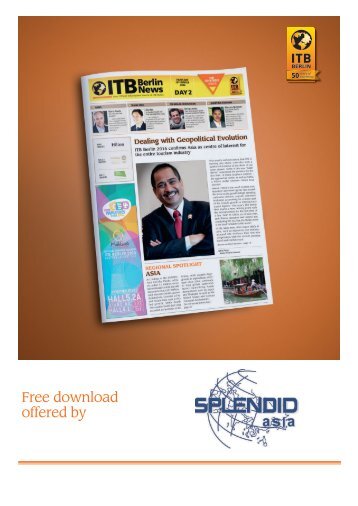
ITB Berlin News - Day 2
- Text
- Hotels
- Tourism
- Tours
- Resort
- Berlin
- Resorts
- Tourismus
- Halle
- Exhibitors
- Aussteller
6 NEWS Taleb Rifai at
6 NEWS Taleb Rifai at ITB Berlin UNWTO Promotes Sustainable Travel Growth GAINING GOVERNMENT SUPPORT AT THE HIGHEST LEVEL IS CRITICAL TO PUSHING ISSUES SUCH TRAVEL FACILITATION, CONNECTIVITY AND ENVIRONMENTAL PROTECTION, WHICH ARE VITAL TO SUSTAINABLE TOURISM DEVELOPMENT Taleb Rifai UNWTO Secretary-General With ITB Berlin 2015 set to showcase more innovation in the travel industry, the World Tourism Organization (UNWTO) - the United Nations agency responsible for the promotion of responsible, sustainable and universally accessible tourism - reviews another year of steady growth. But while increasing tourism numbers are welcomed, the UNWTO is stressing the need to promote sustainable industry practices if long-term growth is to be secured. We asked UNWTO Secretary-General Taleb Rifai to tell us more about the solid annual expansion in the travel sector again - exceeding forecasts. International tourism continued to grow in 2014 in spite of the challenges that we faced last year, including a sluggish and uneven economic recovery, rising geopolitical tensions and health pandemics. According to the UNWTO World Tourism Barometer, international tourism grew 4.7%, with more than 1.1 billion tourists travelling to an international destination during the year. This was the fifth consecutive year of growth for the tourism sector, and once again exceeded our long-term forecast of a 3.8% annual increase for the period 2010-2020. All regions enjoyed an annual rise in tourist numbers, in particular the Americas, which was the best performing region with 7% growth, driven by strong results in North America. Asia and the Pacific saw 5% growth, while Europe and the Middle East grew 4%. These are very positive results in view of the economic situation in Europe; while in the case of the Middle East, the result ends three consecutive years of decline in the number of international tourists in the region. Why is growth so strong in the Americas? As the best performing region in 2014 with 7% growth, the Americas doubled the 3.5% increase registered in 2013. On the back of a stronger economy, a healthy US outbound market helped drive this increase. Among destinations, Mexico posted double-digit growth, North America expanded 8%, and the Caribbean 7%. Arrivals to Central America and South America both increased by 6%, double the rate recorded in 2013 and well above the world average. What are the main themes being pushed by the UNWTO at ITB Berlin this year? UNWTO activities at ITB 2015 include the 5 th Silk Road Ministers’ Meeting, as well as the 30 th Meeting of The World Tourism Network on Child Protection, which gathers representatives from governments, international organizations, NGOs and tourism sector groups to advance the prevention of all forms of exploitation of children within the tourism sector. In addition, we will be holding a special panel, “Community Empowerment through Creative Industries and Tourism: Special focus on Women, Youth, Indigenous Communities and People with Disabilities”, which aims at building awareness of the importance of mainstreaming socioeconomic inclusion, and empowering local communities through tourism industries - with a special focus on vulnerable groups in society. Last year you spoke of your organisation’s mission to reduce poaching in the world. How is this progressing and what more can be done? We continue to consolidate our efforts to fight the illegal poaching that is threatening Africa’s wildlife. The African region’s main tourism asset is integral to the welfare of many local communities that depend on tourism for their livelihoods. In this respect, it is important to note that on March 3 the international community celebrated World Wildlife Day, which this year was dedicated to the issue of wildlife crime. This topic was recently discussed at the 56th Meeting of the UNWTO Commission for Africa held in Angola. Here, our Member States exchanged views and experiences on the problem of wildlife poaching that is affecting ITB BERLIN NEWS • Thursday 5 th March 2015 www.itb-berlin-news.com
NEWS 7 2015 many African countries, and called for increased international awareness on the issue. We continue to work with our African Members to strengthen cooperation and align conservation management strategies, particularly as Africa’s tourism continues to grow – there will be a projected 134 million international arrivals by 2030. At the same time, we are emphasising the need to act on wildlife crime now as this is an issue that not only impacts the environment, but also threatens the livelihoods of millions of people who live from tourism in Africa. A report just published by UNWTO measures the economic value of wildlife watching tourism in Africa. It shows that countries with a major number of visitors in protected areas generate revenues of up to USD 90 million per year; and that wildlife watching represents 80% of the total annual tourism revenue in Africa, a figure that is increasing. There appears to be a growing political commitment to the tourism sector in many countries. What are your feelings about this? There is indeed growing political commitment for tourism worldwide, and we are very pleased since mainstreaming tourism in national and international agendas is one of our organisation’s priorities. Only with a national tourism policy can we ensure that the sector grows and contributes in an effective way to socioeconomic development. Gaining government support at the highest level is critical to pushing issues such travel facilitation, connectivity and environmental protection, which are vital to sustainable tourism development. Having said that, there is still much work to be done and we will continue to call on governments to prioritise tourism as a tool for development, job creation and green growth. We have seen the creation of new groupings of nations such as the Vanilla Islands, a trend facilitated through the UNWTO CAF Commission and the ICAO conference. How important is it for the UNWTO to get behind these projects, and why? UNWTO fully supports these regional initiatives as they are an effective means to reinforce tourism competitiveness by collectively addressing critical challenges such as improving connectivity and visa facilitation. The Vanilla Islands are indeed a good example of this, while similar cooperation exists in Central America, the Caribbean, in Europe with the European Travel Commission, or among the Southern African Development Community (SADC) Member States that recently agreed to introduce a ‘univisa’ to allow free movement within their states. In addition, these initiatives stimulate regional integration and create a stronger and more attractive tourism brand through the valorisation of each of the destination’s unique selling propositions. Sustainability has become a dominant UNWTO theme. Why? Promoting sustainable tourism is UNWTO’s principal mandate as the United Nations Specialised Agency for tourism. This is particularly relevant at a time when the tourism sector continues to grow each year, and is forecast to reach 1.8 billion international tourists by 2030. Though this is an exciting prospect for socioeconomic growth and development it brings, it also underlines our significant responsibility to manage and control this growth. This is a responsibility that I cannot stress enough. If we do not adapt sustainability as the comprehensive condition of our sector, we risk depleting precious natural resources, damaging heritage and disrupting the social values of host destinations. Advancing sustainability also means ensuring that all members of society – particularly those most in need – are able to prosper from tourism’s growth and development. In addition, sustainable tourism development is a great opportunity for our sector since ethical management and the use of innovative technology can lead to better environmental protection, which is crucial for the long-term operation of tourism enterprises. Hall 20 Stand 127 ITB BERLIN NEWS • Thursday 5 th March 2015
- Page 1: THURSDAY 5 th MARCH 2015 ITB QUICKF
- Page 8: 8 NEWS Rewarding Positive Transform
- Page 11 and 12: NEWS 11 © Dmitry A. Mottl Panorama
- Page 13 and 14: NEWS 13 Paradise Found: Aircalin Pu
- Page 15 and 16: ITB BERLIN CONVENTION 15 Escaping t
- Page 17 and 18: EXCLUSIVE INTERVIEW 17 Guest: Darre
- Page 19 and 20: CRUISES SPECIAL FEATURE 19 Take A C
- Page 22 and 23: 22 SPECIAL FEATURE GOLF TOURISM Cit
- Page 25 and 26: This Luxury Travel Feature is proud
- Page 27: This Luxury Travel Feature is proud
- Page 30 and 31: 30 SPECIAL FEATURE ADVERTORIAL LUXU
- Page 32 and 33: 32 REGION ADVERTORIAL AMERICAS Stre
- Page 34 and 35: 34 REGION ADVERTORIAL AMERICAS “T
- Page 36 and 37: 36 REGION AMERICAS Rio de Janeiro O
- Page 38: 38 WHERE TO GOIN BERLIN Alexa Berli
- Page 42 and 43: EXHIBITION GROUNDS GELÄNDEPLAN Hal
- Page 44 and 45: SHUTTLE BUSSES & FAIRGROUND SHUTTLE
- Page 46 and 47: SERVICES SERVICE Airports Informati
- Page 48 and 49: EXHIBITORS FROM A TO Z AUSTELLER VO
- Page 50 and 51: EXHIBITORS FROM A TO Z AUSTELLER VO
- Page 52: EXHIBITORS FROM A TO Z AUSTELLER VO
- Page 55 and 56: D / E / F EXHIBITORS / AUSSTELLER H
- Page 57 and 58:
F / G / H EXHIBITORS / AUSSTELLER H
- Page 59 and 60:
H / I / J / K EXHIBITORS / AUSSTELL
- Page 61 and 62:
K / L / M EXHIBITORS / AUSSTELLER H
- Page 63 and 64:
M / N / O EXHIBITORS / AUSSTELLER H
- Page 65 and 66:
O / P / Q / R EXHIBITORS / AUSSTELL
- Page 67 and 68:
R / S EXHIBITORS / AUSSTELLER HALL
- Page 69 and 70:
S / T EXHIBITORS / AUSSTELLER HALL
- Page 71 and 72:
T / U / V EXHIBITORS / AUSSTELLER H
Inappropriate
Loading...
Mail this publication
Loading...
Embed
Loading...
